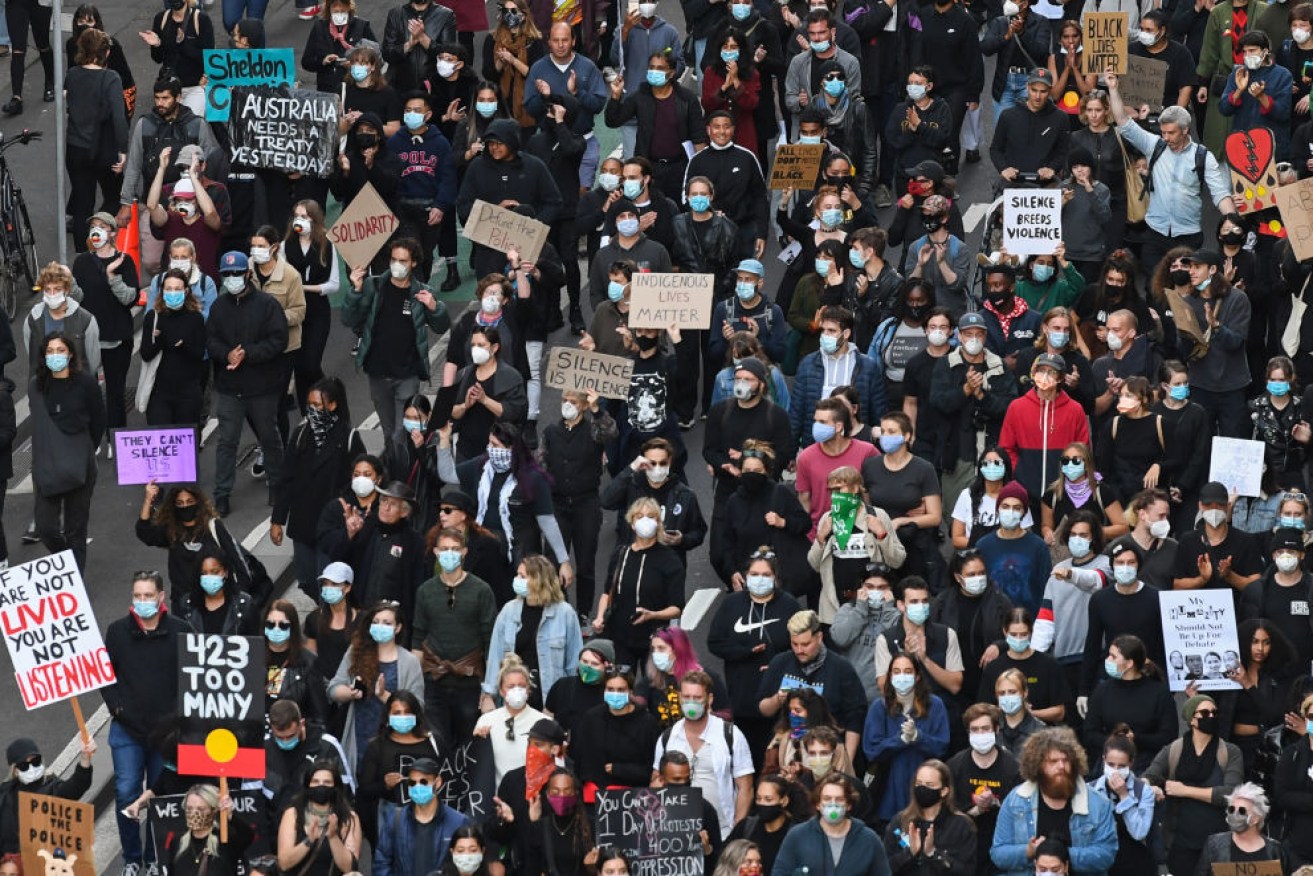‘Charge them’: Scott Morrison warns protesters of second wave’s $25 billion cost


Thousands of protesters pictured marching in solidarity with the 'Black Lives Matter' movement in Sydney. Photo: AAP
Prime Minister Scott Morrison is using the economic cost of a second wave of coronavirus to pressure protesters not to hold more anti-racism rallies.
The Organisation for Economic Co-operation and Development predicts Australia’s economic output could contract by 6.3 per cent in 2020 if there’s another wave of COVID-19.
“That’s a $25 billion cost to the Australian economy,” Mr Morrison told 3AW radio on Thursday.
“People wanting to take [protests] further this weekend are showing a great disrespect to their fellow Australian.”
Asked if police should arrest and charge protesters, Mr Morrison said “I think they should, I mean, I really do think they should, because you can’t have a double standard here.”
One protester at last weekend’s Melbourne rally has tested positive for the coronavirus. The man, in his 30s, developed symptoms 24 hours after marching.
It could be another week before authorities know whether other protesters have caught the virus from him.
Victorian chief health officer Brett Sutton said the man might have been contagious at the rally. He wore a mask, as did many others, but masks don’t provide 100 per cent protection from the coronavirus.
Also on Thursday, Mr Morrison stepped up his rhetoric on mass protests against Indigenous incarceration rates and deaths in custody, accusing protesters of setting back efforts to lift coronavirus restrictions.
“Certainly any further action on this front would be absolutely unacceptable,” he said.
“The double standards that [protesters] allowed themselves to perpetrate by turning up has offended, rightly I think, Australians right across the country.
“The way that it was done and the suggestion that they might do it again risks public support for even the issue they raise.”
Mr Morrison said Australia had no history of slavery, and said the nationwide anti-racism rallies were a “real blocker” to easing coronavirus restrictions.
On Sydney’s 2GB, he said Australia at the time of colonisation “was a pretty brutal place, but there was no slavery … I think what we’re seeing with some of these protests, they start on a fair point when they’re raising issues about … people’s treatment in custody or things like that.
“Fair issue … but now it’s being taken over by other much more politically driven left-wing agendas, which are seeking to take advantage of these opportunities to push their political causes.”
Shadow minister for Indigenous Australians Linda Burney criticised the remarks.
“The Prime Minister’s comments demonstrate a need for a greater understanding and awareness of our nation’s history,” Ms Burney said.
“We cannot achieve meaningful progress on matters such as Reconciliation if, as a nation, we are not aware of the historical context of the challenges we face in the present. One of the crucial elements of the Uluru Statement was a national process of truth-telling.”
Supreme Court bid
Mr Morrison’s call to postpone rallies has been echoed by WA Premier Mark McGowan.
Mr McGowan has pleaded with organisers of a rally planned in Perth this weekend to postpone it until after the coronavirus pandemic.
He again urged people to not attend mass demonstrations, stressing that the organisers of Saturday’s protest had no permit.
“This advice is to take note of that and don’t hold the rally,” Mr McGowan said,
“Please use common sense here. This is about trying to save people’s lives to stop any potential spread of the virus.”
Meanwhile, NSW Police Commissioner Mick Fuller has warned people to stay away from weekend protests.
He said police will go to the Supreme Court to try to have rallies declared illegal.
Mr Fuller said a protest planned for Friday night was unauthorised because the paperwork had not been filed.
Organisers of a second protest on Saturday had lodged an application for permission, but that would be challenged in the courts, he said.
Economic measures
The Prime Minister’s warning about the potential cost of second coronavirus waves comes after the OECD said the federal government should consider what economic support might be needed once existing measures end in September.
It suggests strengthening the social safety net and investing in social housing.
Labor leader Anthony Albanese said Australia needed a transition plan, rather than relying on the government’s prediction of an economic “snapback”.
“Snapback runs the risk of really restricting the growth in the economy and having a severe impact,” he said.
“The OECD has warned that early withdrawal of economic support runs a severe risk of having a negative impact on the economy, on employment and on living standards in Australia.”
Treasurer Josh Frydenberg said the OECD report painted a grim picture for the global economy.
“This report does signal the economic challenges that Australia and the world face,” he said.
“But as we have success on the health front, we are starting to ease the restrictions, and it’s critically important that we maintain that momentum, that we lift those restrictions on the domestic borders. Closed borders cost jobs.”
The head of Australia’s corporate watchdog has warned some businesses could still go under when the economy hits the so-called financial cliff in September.
Some people could also lose their homes as the first recession in nearly 30 years takes its toll.
Australian Securities and Investment Commission chairman James Shipton said while the financial system was preparing for any eventuality as the country worked through the pandemic, there would be casualties.
The Morrison government’s JobKeeper and pumped up JobSeeker schemes are due to end in September while loan payment holidays introduced by the major banks will also cease.
-with agencies








